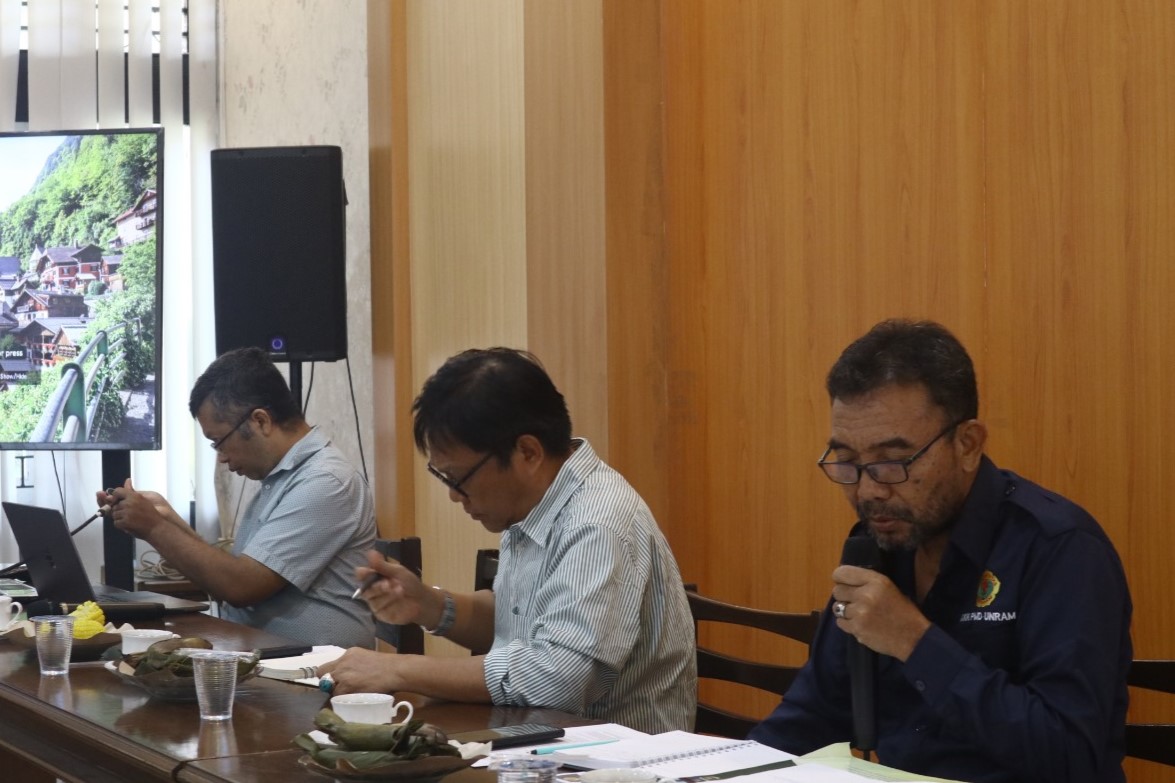LPPM Unram Discusses the Results of Monev Research, Community Service, and Follow-up of Internal Quality Audit Results

Mataram, University of Mataram – The Research and Community Service Institute of the University of Mataram (LPPM Unram) held a discussion of the results of Monev Research and Community Service (PKM), as well as the Follow-up of LPPM AMI Results in 2024. This activity took place in the Main Conference Room of LPPM Unram on Wednesday (17/1).
In this activity attended by Prof. Dr. Ir. Sukartono, M.Agr. as the Head of LPPM accompanied by Prof. Dr. Ir. I Gusti Putu Muliarta Aryana, MP. as Secretary; Head of KKN and Cooperation Center, Dr. Ir. Misbahuddin, ST., MT., IPU.; Head of Program Center, Information Data and Quality Assurance, I Wayan Sudiarta, Ph.D.; and Head of Research Center, Prof. Ir. Buan Anshari, ST., M.Sc.(Eng)., Ph.D..
The implementation of the tri dharma of higher education through teaching, research and community service. The two main activities of the tri dharma of higher education, including research and community service, are a concern for LPPM Unram to consistently improve the quality and quantity of these activities. Improving the quality and quantity of these activities is purely to have a significant impact on the world of academia, industry and society.
In an effort to improve the quality of research and community service activities, LPPM Unram conducts monitoring and evaluation (monev) activities for research and community service grants in 2023. This monev activity is intended to ensure that research and community service grants received and conducted by lecturers in Unram are carried out with full responsibility and beneficial to the community.
Furthermore, in 2024 LPPM Unram prepares lecturers to be able to get more competitive and quality research and community service grants by conducting research and service grant proposal writing assistance activities in 2024. This is also intended to improve Unram’s competitiveness, especially with the achievement of the Main Performance Indicators (IKU).
In addition to discussions related to research and service, LPPM Unram also made various improvisations related to the results of the Internal Quality Audit (AMI) conducted in 2023. AMI activities or internal quality assurance system audits (SPMI) are systemic quality assurance activities by each university autonomously to control and improve the implementation of higher education in a planned and sustainable manner.
This activity is an implementation of one of the cycles in SPMI, namely the evaluation cycle. Evaluation of the implementation of SPMI standards can be done through an audit, which is a process that aims to examine the achievement of the fulfillment of higher education standards after the college has implemented the standards within a certain period of time. SPMI audit is a testing activity carried out systematically, independently, and documented to ensure that the implementation of activities in higher education is in line with procedures and the results are in accordance with standards to achieve predetermined goals.
Standard Setting, Standard Implementation, Standard Evaluation, Standard Control and Higher Education Standard Improvement, known as the abbreviation PPEPP. The Standard Evaluation stage is carried out through an Internal Quality Audit (AMI). AMI is a systematic, independent and documented testing process to ensure the implementation of activities in higher education according to procedures and the results are in line with standards to achieve institutional goals.
AMI is one of the steps to determine the alignment of standards with the implementation that has been carried out on various aspects that have been determined. The implementation of AMI requires good planning to ensure that all AMI components including policy, audit scope, auditors, time and place, and required documents are well prepared. The AMI process itself is carried out in two stages, namely System Audit and Conformity Audit. The results of the two stages are then formulated in the AMI Report. The AMI Report is then used by the Auditee to determine SPMI improvement steps formulated in the Management Review Meeting (RTM).
Prof. Dr. Ir. Sukartono, M.Agr. as the Head of LPPM emphasized that, “related to the results of monev research and community service (PKM) needs for ensuring and improving the quality therein. Furthermore, this activity is also intended to prepare lecturers in making research proposals that can be used in grants within the Higher Education and the university. The next direction is to optimize cooperation in writing and community service activities with universities both domestically and internationally.”
Furthermore, the Professor of the Faculty of Agriculture said, “Meanwhile, for the follow-up of AMI results, LPPM University of Mataram implemented a workspace system (workspace.unram.ac.id) which will be used in recording all research and service activities at LPPM including monev. This system is multiuser-based where one event agenda can be input and completed with collaboration simultaneously.
Some of the conclusions include ensuring that SPMI implementation meets the standards/regulations. Through tracing existing evidence, AMI is carried out to ensure that the management system implemented by the Auditee institution is in accordance with or meets predetermined standards and does not conflict with applicable laws and regulations.
Then ensure the implementation of SPMI in line with the standards/goals/objectives. AMI is an independent, objective, planned and systematic activity, and based on a series of evidence to ensure that the goals and objectives of the established program are actually met.
And identify opportunities for improvement of SPMI. AMI contains an element of consultation that aims to provide added value or improvement for the audited unit, so that the unit can achieve or fulfill its predetermined objectives. Through AMI activities, room for improvement is identified so that suggestions can be formulated for quality improvement in the future, in carrying out tasks to achieve the standards that have been set effectively and responsibly
